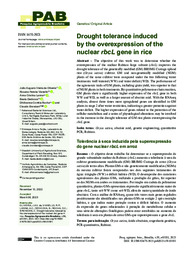Publicações
Drought tolerance induced by the overexpression of the nuclear rbcL gene in rice.
Autoria: OLIVEIRA, J. A. V. de; VIANELLO, R. P.; LANNA, A. C.; DEDICOVA, B.; ROCHA, D. C.; BRONDANI, C.
Resumo: ABSTRACT - The objective of this work was to determine whether the overexpression of the nuclear Rubisco large subunit (rbcL) improves the drought tolerance of the genetically modified (GM) BRSMG Curinga upland rice (Oryza sativa) cultivar. GM and non-genetically modified (NGM) plants of the same cultivar were compared under the two following water treatments: well watered (WW) and water deficit (WD). The performance of the agronomic traits of GM plants, including grain yield, was superior to that of NGM plants in both treatments. By quantitative polymerase chain reaction, GM plants show a significantly higher expression of the rbcL gene in both WW and WD, as well as a larger amount of abscisic acid. With the RNAseq analysis, almost three times more upregulated genes are identified in GM plants in stage 2 after water restriction, indicating a greater protection against water deficit. The higher expression of genes related to the protection of the cellular metabolism and a series of physiological alterations may be involved in the increase in the drought tolerance of GM rice plants overexpressing the rbcL gene. RESUMO - O objetivo deste trabalho foi determinar se a superexpressão da grande subunidade nuclear da Rubisco (rbcL) aumenta a tolerância à seca da cultivar geneticamente modificada (GM) BRSMG Curinga de arroz (Oryza sativa) de terras altas. Plantas GMs e não geneticamente modificadas (NGMs) da mesma cultivar foram comparadas nos dois seguintes tratamentos de água: irrigação (WW) e déficit hídrico (WD). O desempenho dos caracteres agronômicos das plantas GMs, incluindo a produção de grãos, foi superior ao das NGMs em ambos os tratamentos. Por reação em cadeia da polimerase quantitativa, plantas GMs apresentam expressão significativamente maior do gene rbcL, tanto sob WW como sob WD, além de maior quantidade de ácido abscísico. Com a análise de RNAseq, quase três vezes mais genes regulados positivamente são identificados nas plantas GMs no estágio 2 após restrição hídrica, o que indica maior proteção contra o déficit hídrico. O aumento da expressão de genes relacionados à proteção do metabolismo celular e uma série de alterações fisiológicas podem estar envolvidos no aumento da tolerância à seca em plantas de arroz GMs que superexpressam o gene rbcL.
Ano de publicação: 2023
Tipo de publicação: Artigo de periódico
Unidade: Embrapa Arroz e Feijão

